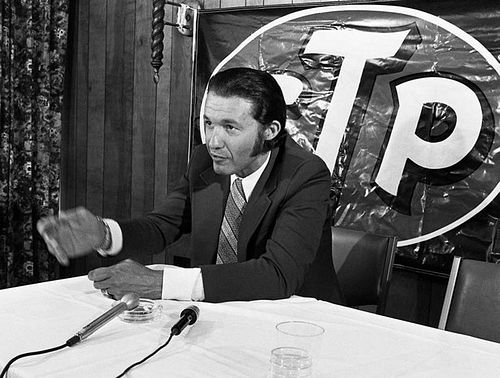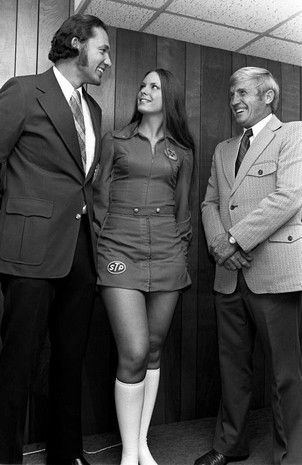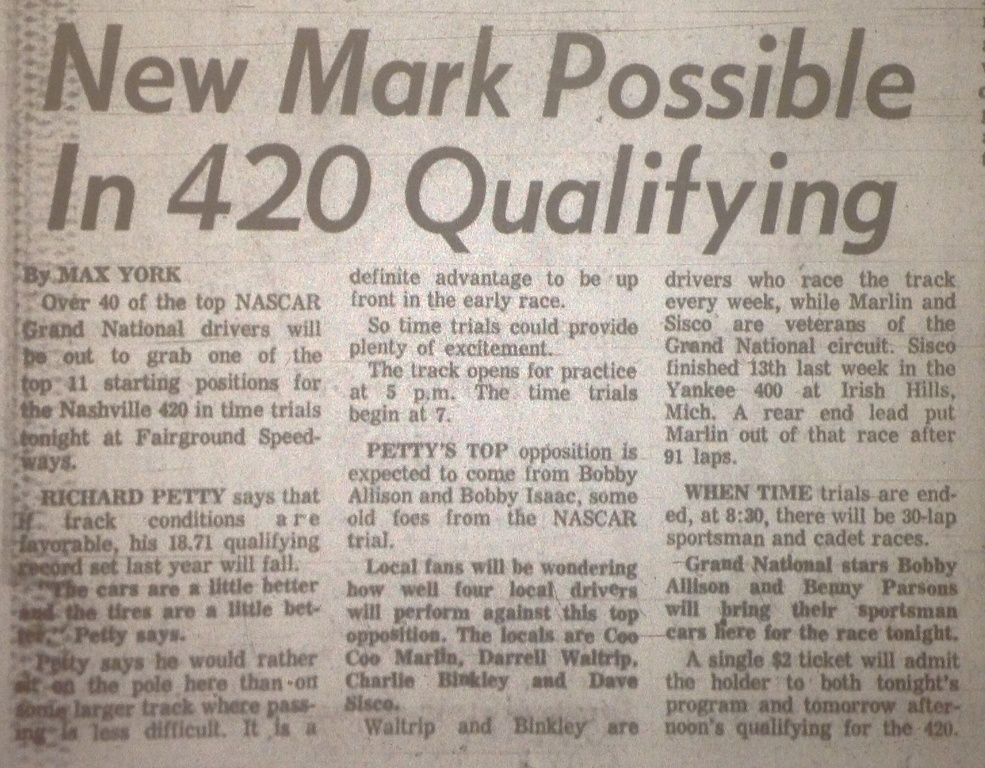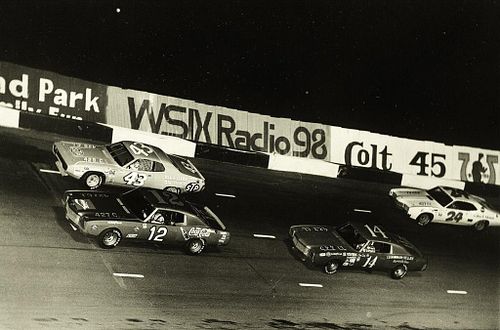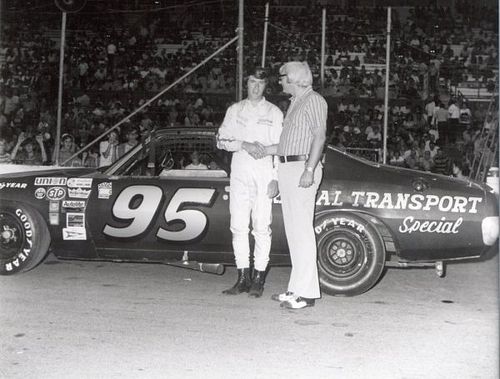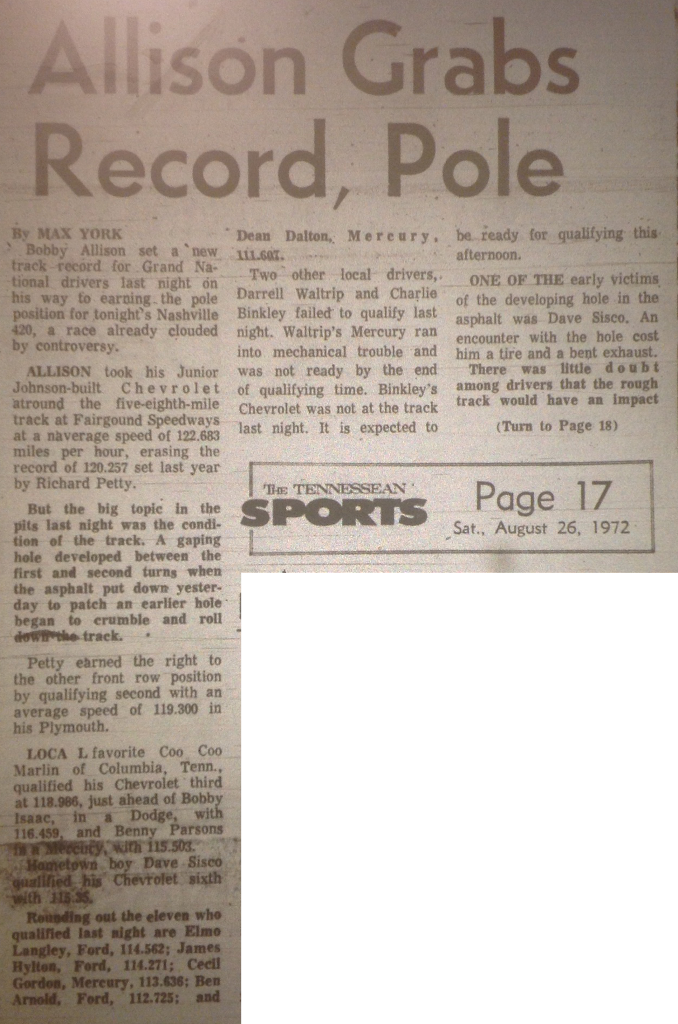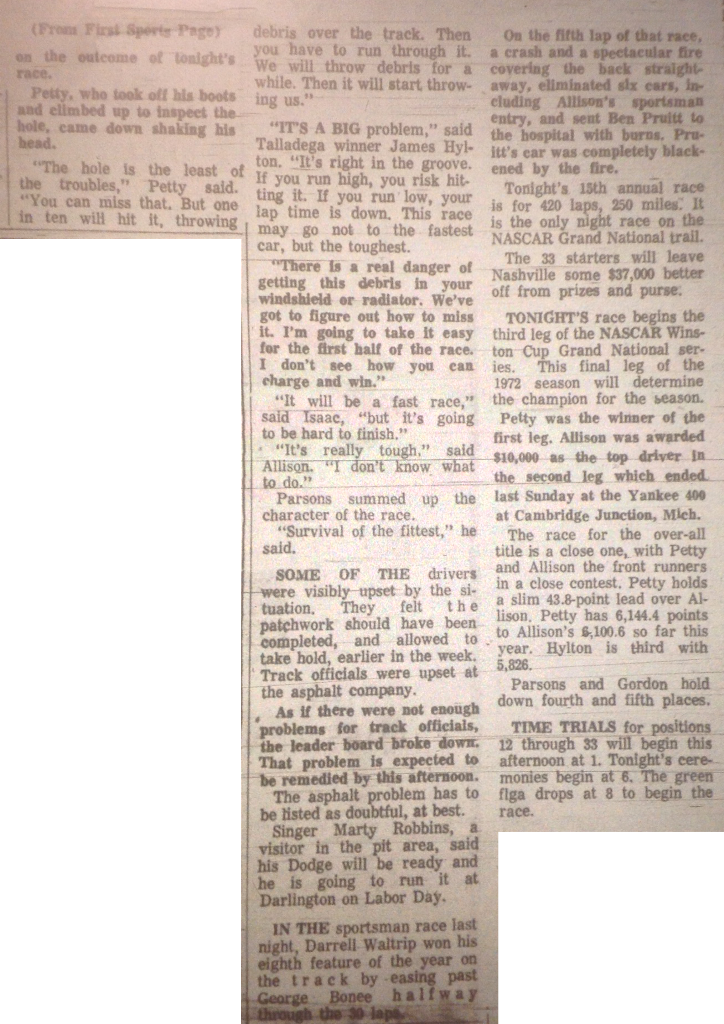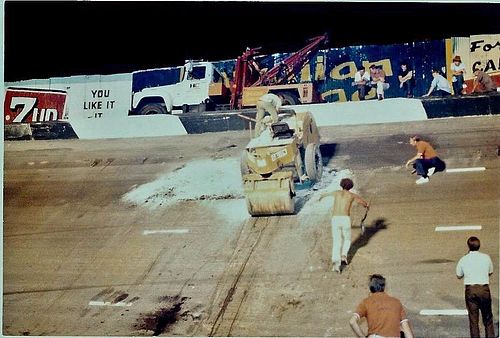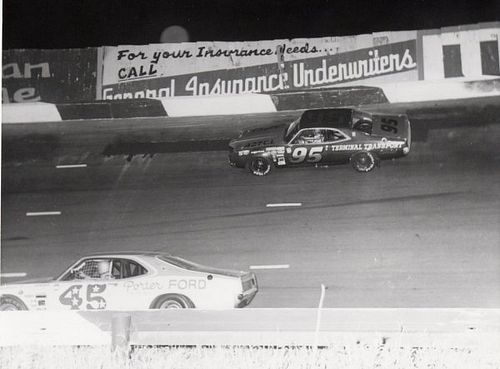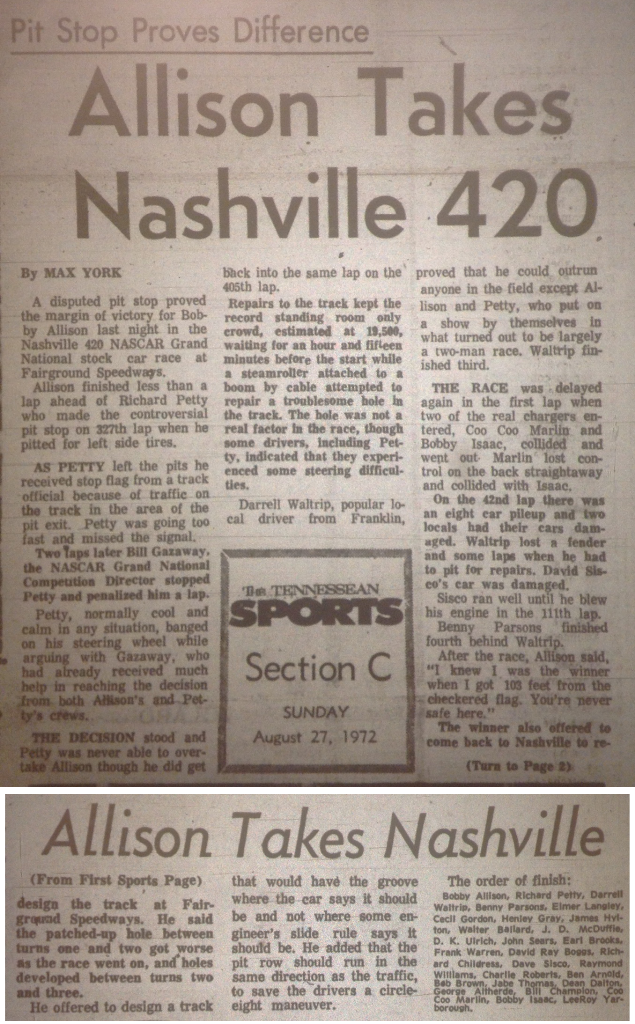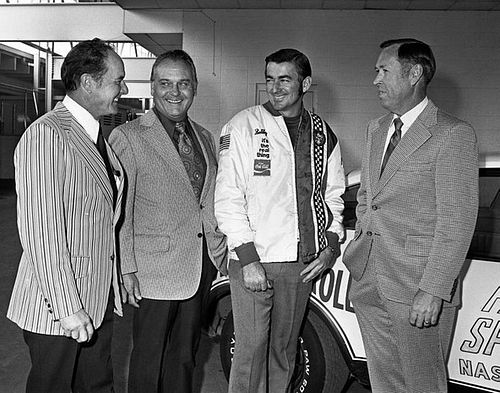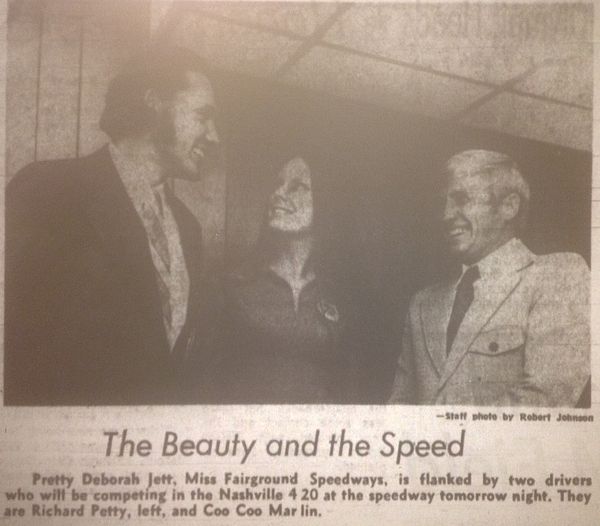The 1972 Nashville 420 was messed up on multiple levels:
- A big pothole developed during qualifying on Friday, and the race was delayed on Saturday as repairs were made.
- The tracks turn 3 electronic leader board went out during Friday night qualifying.
- The King lost valuable time to Bobby Allison because of a messed-up pit road and missed communication between the driver, crew and a NASCAR official.
- The run-down of the race in Greg Fieldens Forty Years of Stock Car Racing Volume 4 book is messed up because he noted the date of the race as August 27th.
- The internet is messed up because just about every web page about the race also notes the date as August 27 likely because they simply ran with Fieldens info or copied the date from another site.
- I messed up by waiting too late to learn all this and missed posting this entry on the race's anniversary date.
But the race was indeed held on Saturday night, August 26th, under the lights not on Sunday the 27th.
King Richard came to town acouple of days before the race for a press conference at the Airport Hilton to help promote the race. Coincidentally, I attended my one and only Blue & Gold Banquet as a Cub Scout at the same Hilton a year or two later - before I'd even learned about racing or Richard Petty.
Joining Petty were Coo Coo Marlin and Miss Fairgrounds Speedway Deborah Jett.
Among the questions answered and opinions given, Petty suggested the Saturday race would be a rough and tough one. On the one hand, that could have been a typical response at any promotional presser. As it turns out though, King's observation was spot-on for how qualifying and the race would unfold. 
Three years earlier, the track had been re-configured with super steep banking. Speeds escalated witheach Cup race from then through 1972. Most expected that trend to continue for the 72 420.
The Richard Howard-owned, Junior Johnson-fielded, Herb Nab-crewed, Coca-Cola sponsored, Bobby Allison-driven Chevrolet was the car to beat. He won the pole in the Friday night qualifying session.
Starting alongside him was King Richard in his STP Plymouth. The 43 team made a transitional change to Dodges in the spring of 1972 (teammate Buddy Baker was already driving one); however, the team continued to race Plymouths the rest of the season on short tracks, at Dover and on Riversides road course. - Russ Thompson
Local driver and 3-time track champion, CooCoo Marlin, started third a career second-best starting spot next to a P2 start at Talladega in 1976. Cecil Gordon and Bobby Isaac rounded out the top 5.
The field gets ready to take the green. - Facebook
Starting back in 12th was a relative unknown to the Cup regulars but a familiar face at Nashville. Darrell Waltrip, the tracks 1970 late model champion and frequent winner, was starting his fourth career Cup race in a former Holman Moody Mercury - the same one Mario Andretti raced to his win in the 1967 Daytona 500. - Russ Thompson pic
As noted in the article from The Tennessean, the condition of the track had already become an issue during qualifying. A pothole had developed, and the cars tried to dodge it during time trials. The drivers blamed the NASCAR. NASCAR blamed track officials. Track promoter Bill Donoho Sr. blamed the paving contractor.
Yet NASCAR and Donoho forged ahead with the 420. Apparently nothing was done to the track during the day on Saturday arguably a mess-up. Yet when race time arrived, the start was delayed almost 90 minutes as track officials THEN rallied to make repairs. In a repair effort that may have even made Billy Biscoe smile, a steam roller was tethered to the winch of a tow truck on the high side of the track. Hey y'all, watch this! - photo: Marchman Family Collection
The race got off to a messed-up start. After taking the green flag, Marlin and Isaac wrecked on the first lap. They squandered their prime starting spots and finished 26th and 27th respectively in the 28-car field.
So who finished 28th and dead last? Lee Roy Yarbrough. Without even taking the green. Lee Roy slowed on the pace lap, pulled off the track at the start, and parked his #45 Bill Seifert Ford without explanation a truly messed-up situation. It was Yarbroughs second and final start at Nashville. - Russ Thompson
After the lap 1 wreck was cleaned up, the race returned to green. Allison led the first 10 percent of the race 42 laps. Cecil Gordon managed to lead lap 43, and then car 43 went to the point. Petty led the next 124 laps. Allison then reclaimed the lead and set sail for over 157 laps.
Petty then reclaimed the lead for 3 laps before needing a pit stop. As the 43 screamed off the tracks quarter-mile inner track used as pit road and prepared to blend into traffic, a NASCAR official held up the stop paddle because of on-track traffic coming out of turn 4. The King already had a head of steam and was likely looking over his right shoulder to find a place to blend in. Consequently, he missed the stop paddle and was on his way back up to speed.
Bill Gazaway wasnt interested in reasons why Petty missed the paddle just that he did. The 43 was called to pit road to serve a 1 lap penalty. The mild-mannered King blew a fuse in the car barking at Gazaway, and the Junior Johnson and Petty crews barked at each other and Gazaway as well.
Petty eventually got back on the lead lap with Allison but could never track him down again to take the lead.
Allison took the win, and an angry Petty finished second. The two were SIXTEEN laps ahead of third place finisher Waltrip. Despite the large deficit from 2nd to 3rd, the finish was easily the best of DWs brief career.
Jeff Droke - RacersReunion member, owner of Nashville420.com and long-time James Hylton crewman - attended his first Cup race that night. He suspects the August 27th mess-up in Fielden's book and a multitude of websites may be the result of NASCAR's official race report. Because of the delay in the start of the race and other cautions during the race, the 420 likely ended after 11PM local time - still early enough to make the deadline for The Tennessean. But 11PM local time Saturday the 26th was 12M Sunday the 27th in the eastern time zone used by NASCAR's office in Daytona Beach.
Following the race, Allison offered to help Donoho and his team re-design the track. And he made good on his offer by visiting the track again in November 1972.
The track - whose turns were banked as steeply as we now know Bristol - was re-designed for a third time. The banking was lowered to 18 degrees the same configuration the fairgrounds track has to this day.
| Fin | Driver | Sponsor / Owner | Car |
| 1 | Bobby Allison | Coca-Cola | '72 Chevrolet |
| 2 | Richard Petty | STP | '72 Plymouth |
| 3 | Darrell Waltrip | Darrell Waltrip | '71 Mercury |
| 4 | Benny Parsons | Pop Kola | '71 Mercury |
| 5 | Elmo Langley | Elmo Langley | '71 Ford |
| 6 | Cecil Gordon | Collins & Aikman | '71 Mercury |
| 7 | Henley Gray | Henley Gray | '71 Ford |
| 8 | James Hylton | Pop Kola | '71 Ford |
| 9 | Walter Ballard | Ballard Racing | '71 Mercury |
| 10 | J.D. McDuffie | J.D. McDuffie | '71 Chevrolet |
| 11 | D.K. Ulrich | D.K. Ulrich | '71 Ford |
| 12 | John Sears | J. Marvin Mills Heating & Air | '70 Plymouth |
| 13 | Earl Brooks | Earl Brooks | '71 Ford |
| 14 | Frank Warren | Frank Warren | '70 Plymouth |
| 15 | David Ray Boggs | David Ray Boggs | '70 Dodge |
| 16 | Richard Childress | Richard Childress | '71 Chevrolet |
| 17 | David Sisco | Charlie McGee | '72 Chevrolet |
| 18 | Raymond Williams | Raymond Williams | '71 Ford |
| 19 | Charlie Roberts | Charlie Roberts | '71 Ford |
| 20 | Ben Arnold | Ben Arnold | '71 Ford |
| 21 | Robert Brown | Allan Brown | '70 Chevrolet |
| 22 | Jabe Thomas | Don Robertson | '70 Plymouth |
| 23 | Dean Dalton | Dean Dalton | '71 Mercury |
| 24 | George Altheide | George Altheide | '70 Dodge |
| 25 | Bill Champion | Bill Champion | '71 Ford |
| 26 | Coo Coo Marlin | Cunningham-Kelley | '71 Chevrolet |
| 27 | Bobby Isaac | K & K Insurance | '71 Dodge |
| 28 | LeeRoy Yarbrough | Bill Seifert | '71 Ford |
--
Schaefer: It's not just for racing anymore.
updated by @tmc-chase: 08/26/20 08:53:42AM
